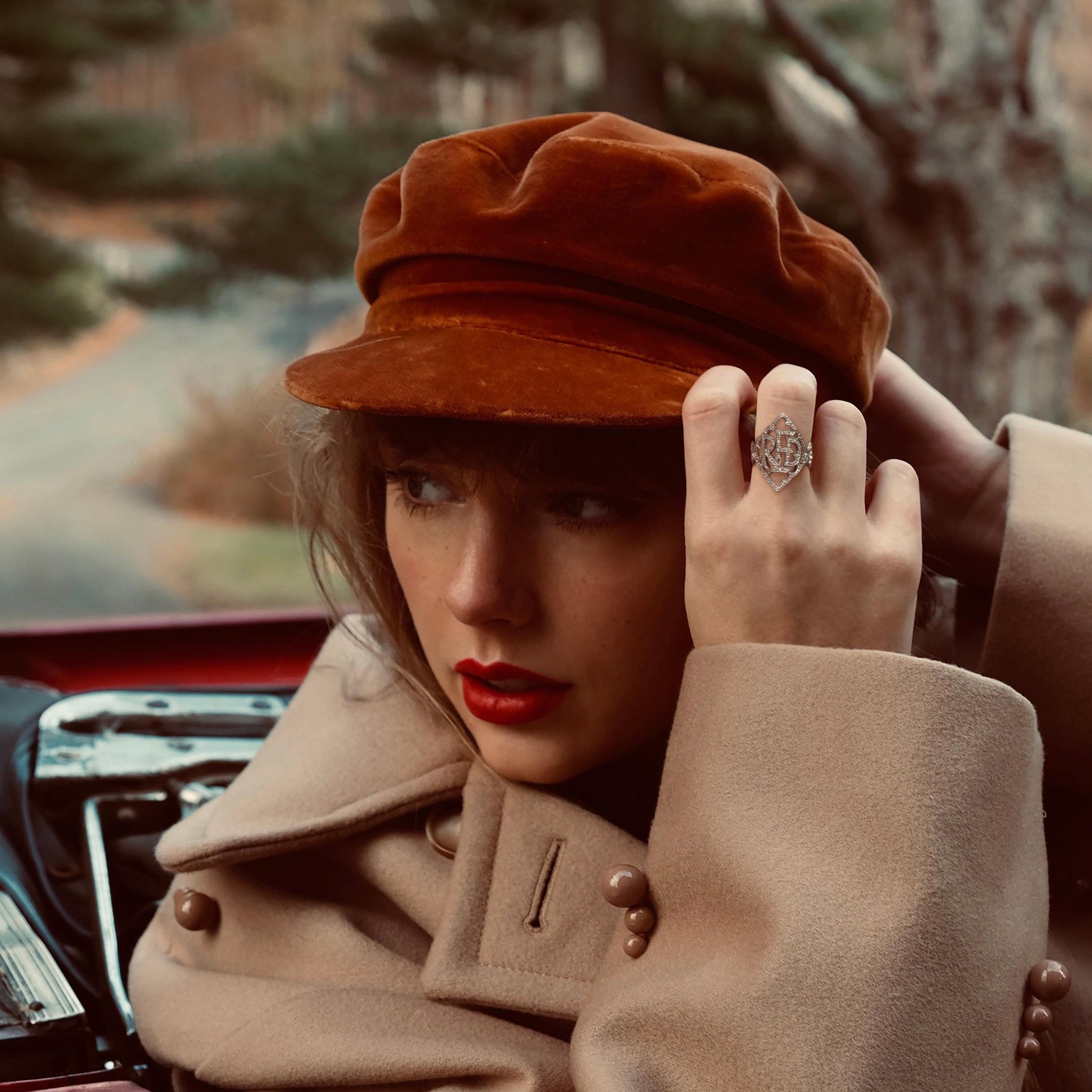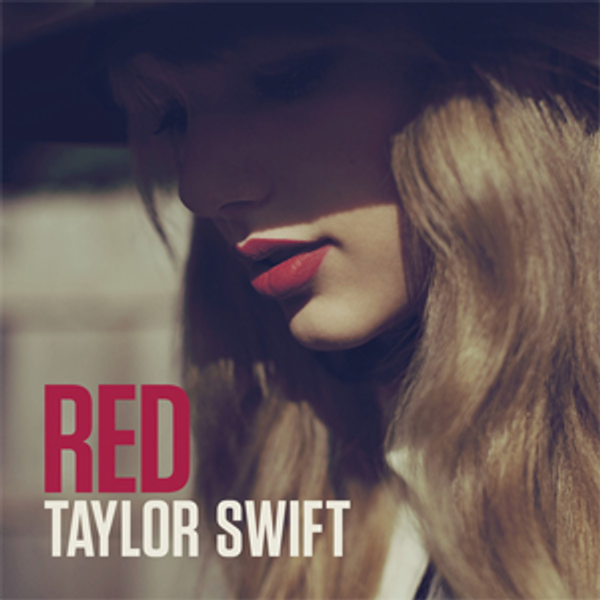
2021 | Sony
By Will Groff
As with so much of Swift’s output, Red can be remembered as it should be: truly, gloriously singular. Just don’t say it’s her best album.





Link copied


Among the stranger collector’s items available to Taylor Swift fans on eBay is a Red-themed Papa John’s pizza box, circa 2012.
It’s a relic from an elaborate and exhausting album rollout that also included limited edition Keds, a four-week countdown on Good Morning America and a Target-exclusive deluxe version that clocked in at a cool 90 minutes.
Swift has always been a maximalist, and Red was the first album to fully capitalize on her potential for cross-promotion.
The accompanying tour — which remains one of the highest-grossing country tours of all time — was an out-and-out spectacle, with elaborate stage design, no fewer than eleven costume changes and a litany of cameo appearances that foreshadowed the dreaded Squad.
Red was an undisputed commercial juggernaut. It was also, depending on who you ask, either her last album as a country artist or her first as a pop star.
In the near-decade since its release, the album has become something of a consensus pick for Swift’s best album, at least as far as critics are concerned. Red nabbed coveted spots on several publications’ best-of-the-decade lists and even cracked the top 100 on the recent update to Rolling Stone’s 500 Greatest Albums of All Time list.
In some ways, Red is an apt choice. The album neatly divides Swift’s early country albums from the pop records that followed, theoretically speaking to her strengths in both arenas.
It’s more mature than Taylor Swift or Fearless, less glossy than 1989 or Lover and certainly nowhere near as brash as Reputation. It’s a safe option for a listmaker who wants to honor the pop superstar without neglecting the country storyteller, and vice versa.
But in revisiting Red, it’s hard to experience the album as the stone-cold classic that critics have retroactively made it out to be. Rather, the elements that bothered reviewers at the time of its release — the start-and-stop pacing, the disorienting array of styles, the moments of uncharacteristic imprecision in the songwriting — feel as true now as they did nine years ago.
That isn’t to say that the album is without its high points. The three Max Martin and Shellback-assisted pop numbers, for one, are among her more enduring hits, and for good reason.
‘We Are Never Ever Getting Back Together’ set fire to indie boy pretensions years before Swift became poptimism’s standard-bearer, while ‘22’ was for a time the irrepressible anthem of the self-deluded post-adolescent. Then there’s ‘I Knew You Were Trouble’, which rides a twitchy guitar riff toward the beat drop that launched a thousand screaming goat videos.
The latter is a shrewd rewrite of the Swiftian breakup narrative, a prelude to the self-aware sendup that was ‘Blank Space’.
Whereas the hapless narrators of ‘White Horse’ and ‘Dear John’ felt blindsided and powerless, the speaker of ‘I Knew You Were Trouble’ seems to take masochistic joy in having her life upended. “I knew you were trouble when you walked in,” Swift sings in the monumental hook, “so shame on me now”.
Per its title, Red mostly deals in unregulated emotions, but there are also moments of maturity and nuance. The U2-flavored opener, ‘State of Grace’, extols the virtues of “learn[ing] to live with the pain,” while the propulsive ‘Holy Ground’ finds Swift idealizing a past relationship in a way that feels not totally unhealthy.
The downtempo numbers are admittedly less effective, mostly serving to temper the album’s pop instincts, though ‘Begin Again’ and ‘All Too Well’ are notable exceptions. The former is an ode to the redemptive power of budding romance, a fitting closer to an album on which love is depicted as equally thrilling and painful.
The latter, a perennial fan-favorite and among the finest compositions of her career, is an epic breakup song that wields its particulars with devastating force. Somewhere out there, at this very moment, a Swiftie is pasting lyrics from the song, potentially accompanied by a red scarf emoji, into Jake Gyllenhaal’s Instagram comments.
Despite being remembered as a cut-and-dried crossover record, Red is actually more of a stylistic mixed bag.
There’s the Ed Sheeran-assisted cafe-pop number ‘Everything Has Changed’, the mandolin-driven folk-pop song ‘Stay Stay Stay’ — which was gratingly twee even before Swift combined it with the Lumineers’ ‘Ho Hey’ during the Red Tour — and ‘The Last Time’, a duet with Gary Lightbody of Snow Patrol that sounds like, well, a Snow Patrol song.
Less interesting than the debate over whether Red is ultimately a country or a pop record, is the question of why Swift chose that moment to begin cutting ties with the country establishment, and the effect her departure had on the already male-dominated landscape.
On October 20, 2012, two days before Swift released Red, Billboard began incorporating digital downloads and streams, as well as radio play on other formats, into its Hot Country Songs chart, which had previously based its rankings only on airplay on country stations.
The decision was controversial, as critics felt that it gave an unfair advantage to songs with crossover potential.
Swift was the most immediate and obvious beneficiary of the new methodology, becoming the first artist ever to top the updated Hot Country Songs chart with ‘We Are Never Ever Getting Back Together’, which had been flagging in the low 20s at country radio.
The song spent nine consecutive weeks at no.1, a record-setting number for a female country artist, and marked the beginning of a new era, during which songs regularly sit atop the Hot Country chart for much longer than was previously possible.
The fact that ‘Cruise’ by Florida Georgia Line — a behemoth of a single that dominated the country charts for months and remains bro-country’s exemplar — was the song that ultimately toppled ‘We Are Never Ever Back Together’ is almost painfully fitting.
Gone were the days when female artists could ride sticky country-pop melodies to the top of the charts; the bros were here to stay.
The timing of Red was impeccable, to a degree that raises interesting questions.
Swift was clearly destined for pop stardom, but could she have somehow foreseen the rise of bro-country and developed an exit strategy?
Was she not immune to the purging of women from the charts? Had she stayed in country, could she have somehow curbed the mass exodus, or would she too have fallen victim to the Luke Bryans, Sam Hunts and Florida Georgia Lines of it all?
In the years since Red marked Swift’s fairly painless transition out of the format, artists like Maren Morris and Kelsea Ballerini have been freer than ever to flirt with pop sounds while remaining firmly in country, a necessity at a time when radio gatekeepers still see women as “tomatoes” in the country music “salad” (groan).
Maybe it’s possible for a future Taylor Swift to be both a country and a pop star.
Maybe Red isn’t a blueprint for crossover success, so much as a remnant of a time when genre lines felt clearer and country artists had to be more cautious about alienating their pop-averse fanbases.
Or maybe, as with so much of Swift’s output, Red can be remembered as it should be: truly, gloriously singular. Just don’t say it’s her best album.
8/10.
The new rerelease of Red, Red (Taylor's Version) is out on Friday Nov. 12. You can purchase the record from Holler's selected partners below:

2021 | Sony
Items featured on Holler are first selected by our editorial team and then made available to buy. When you buy something through our retail links, we may earn an affiliate commission.
For more on Taylor Swift, see below:
